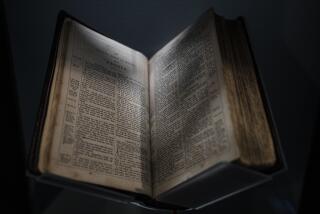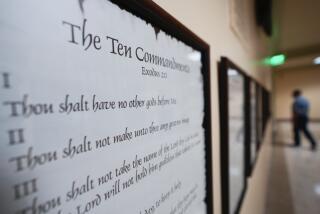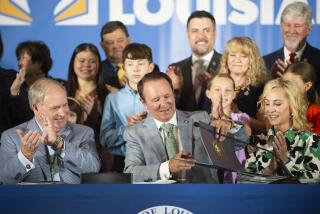Laws That Put ‘God’ on Money and in Pledge
- Share via
Re “Freedom From Religion -- That Too Is a Right,” Commentary, March 12: Michael Newdow is a hero. He is willing to go against the flow for what is right, to insist that the Earth is not flat. Using “God” words on governmentally controlled institutions, practices and money is a violation of the U.S. Constitution and our hard-fought freedom from religious government. It’s high time the “God” words added during the McCarthy era were removed, but timid politicians won’t touch this with a 10-foot pole. It takes someone like Newdow. Thanks, Michael.
Roger Anderson
Simi Valley
Newdow’s biased dissertation on the Pledge of Allegiance confirms my feelings about him based on TV and written interviews: He used “I,” “I’ve” and “me” about 20 times. “We” appears five times, and three of those are in the bothersome “In God we trust.” Maybe we should provide him with some personal currency. Me thinks he doth protest too much, and it is obvious that his ego does not fit its container. I cannot imagine why you chose to waste the ink.
Roger Norton
Valencia
Some of the most spiritual people living today would not be able to affirm “In God we trust” -- the Dalai Lama, for example. American Buddhists are one major group whose spiritual beliefs are disregarded when we recite a pledge that asserts that our nation is “under God.” How would the majority God-believer group feel if we were asked to “follow Buddha’s path” in the Pledge of Allegiance?
Jean Holroyd-Sills
Los Angeles
Newdow has misinterpreted the words “Congress shall make no law respecting an establishment of religion.” That means that no one religion shall be the official religion of the U.S. It also means that no one religion can dictate to Congress, and that all religions have equal rights under the law. Atheism is a godless religion and it should not be allowed to dictate what others may or may not say.
I believe the 9th Circuit Court of Appeals erred in its decision on removing the words “under God,” as Congress, for the majority of the people, inserted these words into the Pledge of Allegiance in 1954. There is no law that says a person must say “under God” when reciting the pledge, so those who do not believe in God may omit these two words. The problem with the Bill of Rights is that the rights are not unlimited but the boundaries were not established. Your rights may not overlap my rights.
George Smith
Huntington Beach
Thank (fill in the blank) for our system that allows the challenges to those who would impose their religious dogma on their constituents and for people like Newdow who risk potentially severe consequences for making those challenges. What I also find fascinating and disturbing: Though the world’s major organized religions preach of tolerance in lofty tones, they are amazingly less tolerant of those of us who don’t need a three-letter word to define
Ric Levine
Thousand Oaks
More to Read
Sign up for Essential California
The most important California stories and recommendations in your inbox every morning.
You may occasionally receive promotional content from the Los Angeles Times.













